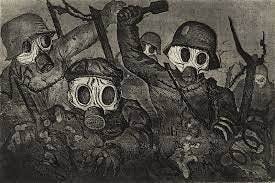Let the boy try along this bayonet-blade How cold steel is, and keen with hunger of blood; Blue with all malice, like a madman's flash; And thinly drawn with famishing for flesh. Lend him to stroke these blind, blunt bullet-leads, Which long to nuzzle in the hearts of lads, Or give him cartridges of fine zinc teeth Sharp with the sharpness of grief and death. For his teeth seem for laughing round an apple. There lurk no claws behind his fingers supple; And God will grow no talons at his heels, Nor antlers through the thickness of his curls.
What we love about this poem…
The half-rhymes Owen uses are purposefully jarring, and so this poem is formally uncomfortable to read, fitting its stark subject of the corruptive influence of war on those drawn into it.
Disturbing too are the weapons themselves—bullets that ‘long to nuzzle’—which seem to be as charmed by the vulnerabilities of new young soldiers as they are themselves alluring.
About the Author
Wilfred Owen (1893-1918) was a one of the leading World War I poets. His work was innovative in both form and subject matter, turning away from idealistic and nationalistic depictions of war in favor of its grim reality: the day-to-day tedium, the horror of the battlefield, the unimaginable scale of the violence, the physical and psychological impact of war.
Owen was killed in action one week before the end of World War I. Most of his poems were published posthumously, through the efforts of his friends and supporters including the authors Sigfried Sassoon and Edith Sitwell.
To read alongside…
‘Exposure’ is another searingly realistic poem by Owen, describing the physical and emotional toll on soldiers whose ‘brains ache’ in the brutally cold weather at the Front.
Jane Weir, ‘Poppies’, from a 2009 collection commissioned by Carol Ann Duffy (Exit Wounds) takes the perspective of a bereaved mother.
Carol Ann Duffy, ‘War Photographer’, from her first major collection Standing Female Nude (1985), thinks about the ethics of visually documenting conflicts, especially the individual human suffering.
Alfred Lord Tennyson, ‘Charge of the Light Brigade’, depicts the heavy cavalry losses stemming from a misinterpreted order at the Battle of Balaclava (1854), written that same year.
Ted Hughes, ‘Bayonet Charge’, imagines ‘going over the top’ in his collection Hawk in the Rain (1957).
Simon Armitage, ‘Remains’ was originally written for the Channel 4 documentary about conflict and PTSD, The Not Dead (2007): a series of interviews with ex-soldiers who served in the Gulf, Bosnia and Malayan wars. The documentary includes a dramatic reading of the poem.
And for American perspectives: Claude McKay’s ‘If We Must Die’ (read here) and also Joseph Seaman Cotter, Jr’s poetry about World War I, including ‘Sonnet to Negro Soldiers’, dedicated to the Ninety-Second Division, U.S. National Army and originally published in The Crisis; the June 1918 issue was dedicated to the African American soldiers participating in the Armed Services.
Suggest a LitHit!
Tell us your own favourites from literature you've read, and we can feature you as a Guest Curator. Just email us with the following information:
Your full name
The title of the book you're suggesting
The location of the excerpt within the book (e.g., "in the middle of chapter 5"), or the excerpt itself copied into the email or attached to it (in Word)
Why you love it, in just a few sentences
About LitHits
LitHits helps you make time for reading by bringing you unabridged excerpts from brilliant literature that you can read on the go, anytime or any place. Our curators carefully select and frame each excerpt so that you can dive right in. We are more than a book recommendation site: we connect you with a powerful, enduring piece of literature, served directly to your mobile phone, tablet or computer.
You might also enjoy...
Feedback
We'd love to hear your thoughts on our newsletter:
kshepherdb@yahoo.co.uk
Graphic design by Sara Azmy
All curation content © 2023 LitHits. All rights reserved.



